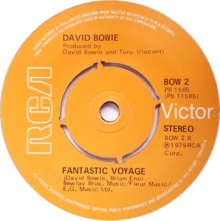
The Man Who Sold the World is the third studio album by the English musician David Bowie, originally released through Mercury Records in the United States on 4 November 1970 and in the United Kingdom on 10 April 1971. Produced by Tony Visconti and recorded in London from April to May 1970, the album features the first appearances on a Bowie record of guitarist Mick Ronson and drummer Mick Woodmansey, who later became famous as members of the Spiders from Mars.
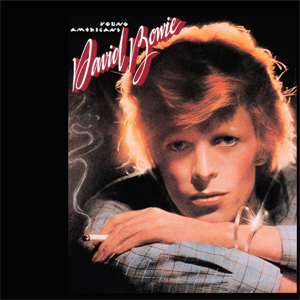
Young Americans is the ninth studio album by the English musician David Bowie, released on 7 March 1975 through RCA Records. A departure from the glam rock style of previous albums, the album showcased Bowie's interest in soul and R&B. Music critics have described the record as blue-eyed soul; Bowie himself labelled the album's sound "plastic soul".

"Heroes" is the 12th studio album by the English musician David Bowie, released on 14 October 1977 through RCA Records. Recorded in collaboration with musician Brian Eno and producer Tony Visconti, it was the second release of his Berlin Trilogy, following Low, released in January the same year, and the only one wholly recorded in Berlin. Sessions took place in mid-1977 after Bowie completed work on Iggy Pop's second solo album Lust for Life. Much of the same personnel from Low returned for "Heroes", augmented by King Crimson guitarist Robert Fripp.

Lodger is the 13th studio album by the English musician David Bowie, released on 25 May 1979 through RCA Records. Recorded in collaboration with musician Brian Eno and producer Tony Visconti, it was the final release of his Berlin Trilogy, following Low and "Heroes". Sessions took place in Switzerland in September 1978 during a break in the Isolar II world tour, and in New York City in March 1979 at the tour's end. Most of the same personnel from prior releases returned, and future King Crimson guitarist Adrian Belew joined from the tour. The sessions saw the use of techniques inspired by Eno's Oblique Strategies cards, such as having the musicians swap instruments and play old songs backwards.
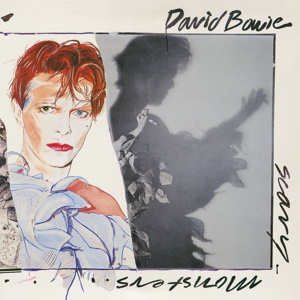
Scary Monsters (and Super Creeps), also known simply as Scary Monsters, is the 14th studio album by the English musician David Bowie, released on 12 September 1980 through RCA Records. His first album following the Berlin Trilogy (Low, "Heroes" and Lodger), Scary Monsters was Bowie's attempt to create a more commercial record after the trilogy proved successful artistically but less so commercially.
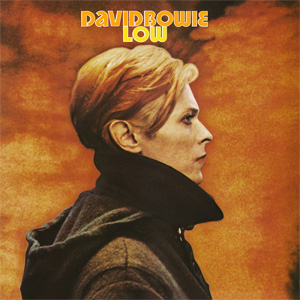
Low is the eleventh studio album by the English musician David Bowie, released on 14 January 1977 through RCA Records. The first of three collaborations with producer Tony Visconti and musician Brian Eno that became known as the Berlin Trilogy, the project originated following Bowie's move to France in 1976 with his friend Iggy Pop to rid themselves of their drug addictions. There, Bowie produced and co-wrote Pop's debut studio album, The Idiot, featuring sounds the former would explore on his next record. After completing The Idiot, sessions for Low began at Hérouville's Château d'Hérouville in September 1976 and ended in October at Hansa Studios in West Berlin, where Bowie and Pop had relocated.
"The Man Who Sold the World" is a song by English singer-songwriter David Bowie. The title track of Bowie's third studio album, it was released in November 1970 in the US and in April 1971 in the UK by Mercury Records. Produced by Tony Visconti, it was recorded at Trident and Advision Studios in London in May 1970, towards the end of the album's sessions; Bowie recorded his vocal on the final day of mixing for the album, reflecting his generally dismissive attitude during the sessions. Musically, it is based around a "circular" guitar riff from Mick Ronson. Its lyrics are cryptic and evocative, being inspired by numerous poems including the 1899 "Antigonish" by William Hughes Mearns. Bowie's vocals are heavily "phased" throughout and have been described as "haunting".
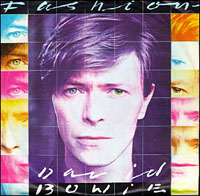
"Fashion" is a song by English musician David Bowie from his 14th studio album Scary Monsters (1980). Co-produced by Bowie and Tony Visconti and recorded from February to April 1980 at New York and London, it was the last song completed for the album. Originating as a reggae parody titled "Jamaica", "Fashion" is a post-punk, dance and funk track structurally similar to Bowie's "Golden Years". King Crimson guitarist Robert Fripp contributed lead guitar.
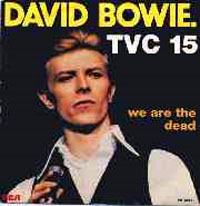
"TVC 15" is a song by English musician David Bowie, released on his 1976 album Station to Station. RCA Records later released it as the second single from the album on 30 April 1976. The song was recorded in late 1975 at Cherokee Studios in Los Angeles. Co-produced by Bowie and Harry Maslin, the recording featured guitarists Carlos Alomar and Earl Slick, bassist George Murray, drummer Dennis Davis, pianist Roy Bittan and Warren Peace on backing vocals. The upbeat song is mostly art rock performed in a style reminiscent of the 1950s. Lyrically, the song concerns a character's girlfriend being eaten by a television set. It was inspired by a dream of Iggy Pop's and Bowie's role in The Man Who Fell to Earth (1976). Some lyrics are also influenced by the Yardbirds and Kraftwerk.
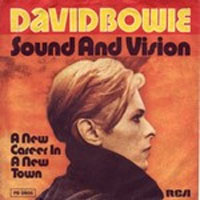
"Sound and Vision" is a song by the English musician David Bowie. It was released in January 1977 by RCA Records on side one of his 11th studio album Low. RCA later chose it as the first single from the album. Co-produced by Bowie and Tony Visconti, the song was recorded at the Château d'Hérouville in Hérouville, France, in September 1976, and completed at Hansa Studios in West Berlin in October and November. The song began as a simple G major chord progression that Bowie gave to the backing musicians, writing and recording his vocals afterward. It features backing vocals from Brian Eno and Visconti's then-wife Mary Hopkin.

"Boys Keep Swinging" is a song by English musician David Bowie, released on 27 April 1979 by RCA Records in the United Kingdom as the lead single from his 1979 album Lodger. It was written by Bowie and Brian Eno and recorded in Montreux and New York City in September 1978 and March 1979. The recording utilised techniques from Eno's Oblique Strategies cards, which resulted in the musicians swapping instruments. Adrian Belew contributed a guitar solo, which he played receiving little guidance and was composited from multiple takes. The song was also built on the same chord sequence as the album track "Fantastic Voyage". Musically, "Boys Keep Swinging" contains elements of glam rock, funk and new wave, while lyrically, the song deals with the concept of gender identity, featuring various gender-bending lyrics. Bowie himself stated that the song was full of irony.
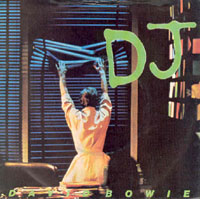
"D.J." is a song by English musician David Bowie, released on 29 June 1979 as the second single from his 1979 album Lodger. It was written by Bowie, Brian Eno and Carlos Alomar and recorded in Montreux and New York City in September 1978 and March 1979. A cynical comment on the cult of the DJ, the track includes a guitar solo by Adrian Belew, which was recorded in multiple takes, and then mixed back together for the album track. Bowie mimics David Byrne of Talking Heads in his vocal performance. Its accompanying music video, directed by David Mallet, features Bowie casually walking down London's Earl's Court Road as passersby recognise him and follow him, interjected with Bowie as the tortured DJ destroying his studio. The single charted at number 29 in the UK and has received positive reviews.
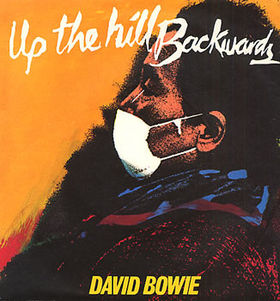
"Up the Hill Backwards" is a song by English musician David Bowie, released on his 1980 album Scary Monsters . It was later issued by RCA Records as the fourth and final single from the album in March 1981. Originally written under the title "Cameras in Brooklyn", the song was recorded between February and April 1980 at the Power Station in New York City and Good Earth Studios in London. The recording features backing vocalists, guitar contributions from Robert Fripp and acoustic guitar played by co-producer Tony Visconti. Lyrically, the song concerns the struggles of facing a crisis, partially influenced by Bowie's divorce from his wife Angie. Musically, the song contains numerous time signature changes and a Bo Diddley-inspired beat.

"Peace on Earth/Little Drummer Boy" is a Christmas song performed by English singer-songwriter David Bowie and American singer Bing Crosby. Recorded on 11 September 1977 at ATV Elstree Studios near London for Crosby's television special Bing Crosby's Merrie Olde Christmas, the song features Crosby singing 1941 standard "The Little Drummer Boy" while Bowie sings the counterpoint tune "Peace on Earth", written by the special's musical supervisors Ian Fraser and Larry Grossman, and scriptwriter Buz Kohan, specifically for the collaboration. The duet was one of Crosby's final recordings before his death in October 1977.

The Berlin Trilogy consists of three studio albums by English musician David Bowie: Low, "Heroes" and Lodger (1979). Bowie recorded the albums in collaboration with English musician Brian Eno and American producer Tony Visconti. The trilogy originated following Bowie's move from Los Angeles to Europe with American singer Iggy Pop to rid themselves of worsening drug addiction. Influences included the German krautrock scene and the recent ambient releases of Eno.
"Panic in Detroit" is a song written by English singer-songwriter David Bowie for the album Aladdin Sane in 1973. Bowie based it on friend Iggy Pop's descriptions of revolutionaries he had known in Michigan and Pop's experiences during the 1967 Detroit riots. Rolling Stone magazine called the track "a paranoid descendant of the Motor City's earlier masterpiece, Martha and the Vandellas' "Nowhere to Run"".

"Look Back in Anger" is a song written by English artists David Bowie and Brian Eno for the album Lodger (1979). It concerns "a tatty 'Angel of Death'", and features a guitar solo by Carlos Alomar.
"Let Me Sleep Beside You" is a song written and recorded by English singer-songwriter David Bowie. It was recorded on 1 September 1967 at Advision Studios in London and marked the beginning of Bowie's working relationship with producer Tony Visconti, which would last for the rest of Bowie's career. A departure from the pop and music hall-influenced material of Bowie's 1967 self-titled debut album and other singles for Deram Records, the song displays a more rock-oriented sound with a cello arrangement from Visconti. The impressionist lyrics also depart from Bowie's prior works, describing love using the act of sleeping together rather than through emotional attachment. The song was rejected by Deram for release as a single, purportedly due to the risqué title. It remained unreleased until 1970's The World of David Bowie compilation.
"Karma Man" is a song written and recorded by English singer-songwriter David Bowie. It was recorded on 1 September 1967 at Advision Studios in London and marked the beginning of Bowie's working relationship with producer Tony Visconti, which would last for the rest of the artist's career. The song expresses Bowie's growing interest in Tibetan Buddhism, concerning a character who is put on display as a "freak" in a carnival tent. The music reflects the Buddhist themes and was likened to the works of the Beatles. Initially proposed as a B-side, it remained unreleased until The World of David Bowie compilation in March 1970. Bowie performed the song during two of his BBC radio sessions, one of which was released on the 2000 compilation Bowie at the Beeb.
